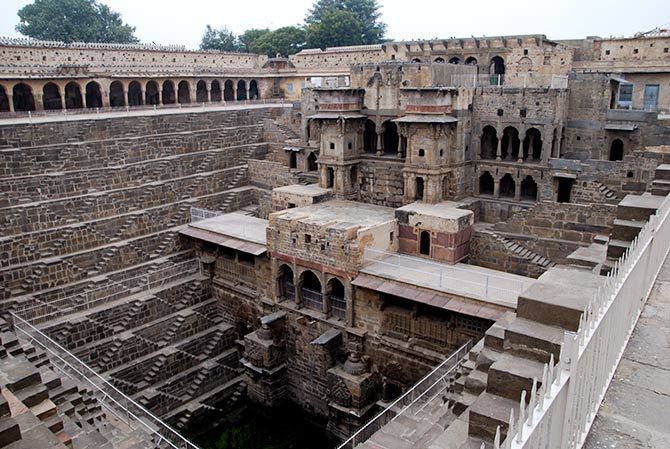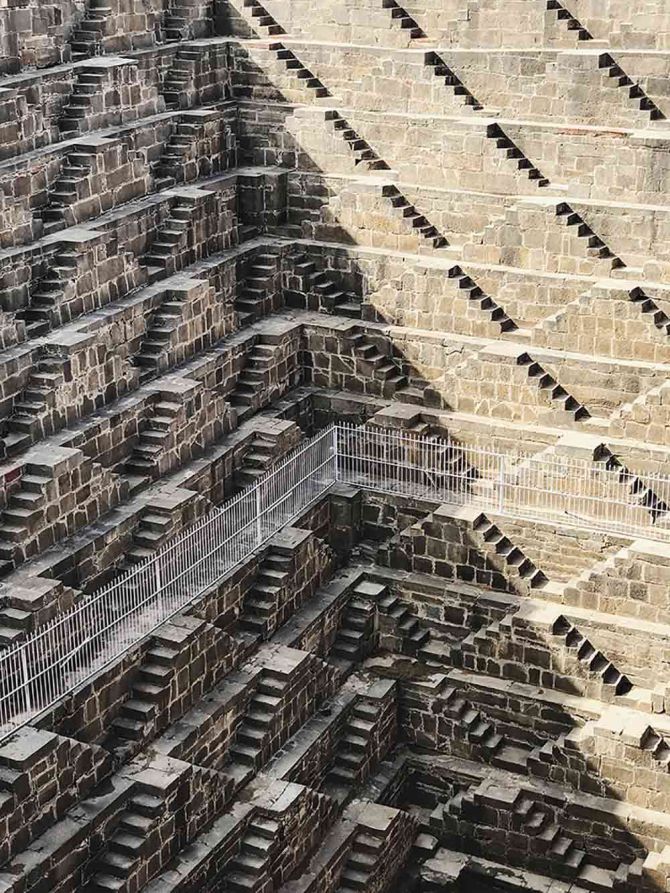Dedicated to the goddess of happiness, this beautiful tourist attraction remains spectacular in its desolation, says Geetanjali Krishna.

For many people, detours offer some of the greatest joys of road trips.
To me, however, the unending traffic on Indian roads usually takes away from the pleasure of impulsively turning off one's path and adding hours to one's journey.
Yet, last month, when on the road from Delhi to Ranthambore, a tiny dot on Google Maps caught my eye. I simply had to go there, even though the detour would cost us a couple of hours at least.
For, in the now hazy realms of my childhood memories, there were stories upon stories of Chand Baori, the mysterious stepwell in the middle of nowhere -- hard to find, but cool and full of water even in the heat of the desert summer.
Over the years, I met few people who had been there, but many who spoke of its beauty. Nobody knew where exactly it was, you see. Yet, here it was, a prosaic little dot on the map on my phone.
It was a blisteringly hot afternoon, but this was a detour I simply had to take.
So we went off the highway on to a rural road in Rajasthan's Abhaneri district.

At first glance, Chand Baori seemed disappointingly different from the place of my childhood imagination. All manicured and fenced in.
Thanks to the rather unimaginative restoration work undertaken by the Archaeological Survey of India, it is no longer even a functioning well. Moreover, after a tourist fell while climbing its precipitous steps, going down to its base is no longer permitted.
However, the first glimpse of the step well, in all its geometrical perfection, was magical.
Terraces, all beautifully carved, looked as if they were stacked one upon the other on a series of diagonal staircases that cast a wealth of shadows in the noon day sun.
Beneath, right at the bottom, lay a deep green pool of water.
It was, all in all, about 64 feet deep and descended 13 floors to the water level.

Our guide told us that Chand Baori had been built over a thousand years ago by King Chanda of the Gujara Pratihara clan and was dedicated to Harshat Mata, the goddess of happiness.
He also told us that the exquisitely carved but defaced statues and pillars strewn in the terraces of Chand Baori were from her temple next door. Of the same vintage as Chand Baori, it had been demolished by Muslim invaders in the 10th century.
As we walked around the terraces, a flock of pigeons suddenly flew out from the innards of the well. "Many believe that this place is haunted," said the guide.
I looked around at the statues of faceless gods and goddesses recognisable by their steeds and symbols alone and felt the occasional breath of cold air from the well -- I could well believe it.
The Harshat Mata Temple next door also had a strange, almost melancholy, air about it.
Judging from the quality of the sculptures and the huge plinth that was still intact, it must have once been an imposing structure. Today, however, it looks like it has been built from blocks that don't quite fit together.
Apparently, over the years, it has been reconstructed from the rubble, though many of its pillars, columns and statues lay scattered in the temple courtyard and in the corridors of the structure, like memories of a violent past.
Yet, in spite of it all, the temple remains active and sees a steady stream of devotees.
As I looked around at the broken sculptures and crumbling walls, something struck me.
If the goddess of happiness could carry on living in a desolate, broken house, surrounded by rubble, perhaps we could all learn a thing or two from her.
It was time to leave, for the detour had cost us a considerable amount of time.
"Let's come back here again when the weather is cooler," my daughter said. "Now that we have located it on Google Maps, we can find it anytime!"
I sighed as we sped away from the magical step well of my childhood imagination.
Now that it was just an extremely accessible dot on the map, Chand Baori had lost some of its mystery.













 © 2025
© 2025